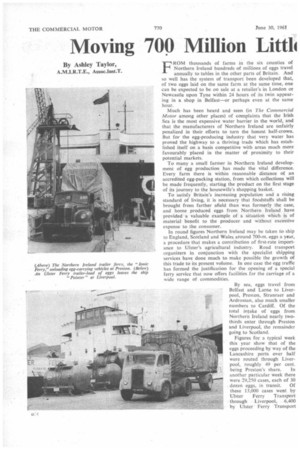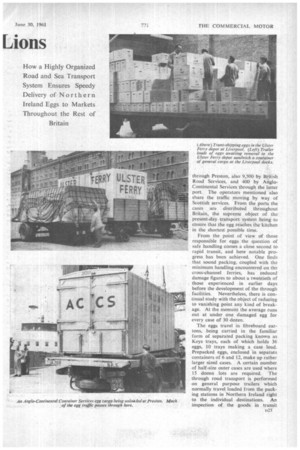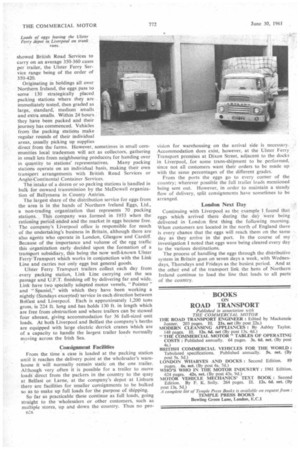Moving 709 Million Litt11 Lions
Page 90

Page 91

Page 92

If you've noticed an error in this article please click here to report it so we can fix it.
By Ashley Taylor,
Assoc.Inst.T.
FROM thousands of farms in the six counties of Northern Ireland hundreds of millions of eggs travel annually to tables in the other parts of Britain. And so well has the system of transport been developed that, of two eggs laid on the same farm at the same time, one can be expected to be on sale at a retailer's in London or Newcastle upon Tyne within 24 hours of its twin appearing in a shop in Belfast—or perhaps even at the same hour.
Much has been heard and seen (in The Commercial Motor among other places) of complaints that the Irish Sea is the most expensive water barrier in the world, and that the manufacturers of Northern Ireland are unfairly penalized in their efforts to turn the honest half-crown. But for the egg-producing industry that very water has proved the highway to a thriving trade which has established itself on a basis competitive with areas much more favourably placed in the matter of proximity to their potential markets.
To many a small farmer in Northern Ireland development of egg production has made the vital difference. Every farm there is within reasonable distance of an accredited egg-packing station, from which collections will be made frequently, starting the product on the first stage of its journey to the housewife's shopping basket.
To satisfy Britain's increasing population and a rising standard of living, it is necessary that foodstuffs shall be brought from farther afield than was formerly the case, and home produced eggs from Northern Ireland have provided a valuable example of a situation which is of material benefit to the producer and without excessive expense to the consumer.
In round figures Northern Ireland may be taken to ship to England, Scotland and Wales around 700-m. eggs a year, a procedure that makes a contribution of first-rate importance to Ulster's agricultural industry. Road transport organizers in conjunction with the specialist shipping services have done much to make possible the growth of this trade to its present volume. In one case the egg traffic has formed the justification for the opening of a special ferry service that now offers facilities for the carriage of a wide range of commodities.
By sea, eggs travel from Belfast and Lame to Liverpool, Preston, Stranraer and Ardrossan, also much smaller numbers to Cardiff. Of the total intake of eggs from Northern Ireland nearly twothirds enter through Preston and Liverpool, the remainder going to Scotland.
Figures for a typical week this year show that of the eggs proceeding by way of the Lancashire ports over half were routed through Liverpool, roughly 49 per cent.
being Preston's share. In another particular week there were 29,250 cases, each of 30 dozen eggs, in transit. Of these 13,000 cases went by Ulster Ferry Transport through Liverpool, 6,400 by Ulster ferry Transport through Preston, also 9,500 by British Road Services, and 400 by AngloContinental Services through the latter port. The operators mentioned also share the traffic moving by way of Scottish services. From the ports the cases are distributed throughout Britain, the supreme object of the present-day transport system being to ensure that the egg reaches the kitchen in the shortest possible time.
From the point of view of those responsible for eggs the question of safe handling comes a close second to rapid transit, and here notable progress has been achieved. One finds that sound packing, coupled with the minimum handling encountered on the cross-channel ferries, has reduced damage figures to about a twentieth of those experienced in earlier days before the development of the through
facilities. Nevertheless, there is continual study with the object of reducing to vanishing point any kind of breakage. At the moment the average runs Out at under one damaged egg for every case of 30 dozen.
The eggs travel in fibreboard cartons, being carried in the familiar form of separated packing known as Keys trays, each of which holds 36 eggs, 10 trays making a case load. Prepacked eggs, enclosed in separate containers of 6 and 12, make up rather larger sized cases. A certain number of half-size outer cases are used where 15 dozen lots are required. The through road transport is performed on general purpose trailers which normally travel loaded from the packing stations in Northern Ireland right to the individual destinations. An inspection of the goods in transit showed British Road Services to carry on an average 350-360 cases per trailer, the Ulster Ferry Service range being of the order of 350-420.
Originating in holdings all over Northern Ireland, the eggs pass to some 130 strategically placed packing stations where they are immediately tested, then graded as large, standard, medium smalls and extra smalls. Within 24 hours they have been packed and their journey has commenced. Vehicles from the packing stations make regular rounds of their individual areas, usually picking up supplies direct from the farms. However, sometimes in small communities local tradesmen will act as collectors, gathering in small lots from neighbouring producers for handing over in quantity to stations' representatives_ Many packing stations operate on an individual basis, making their own transport arrangements with British Road Services or Anglo-Continental Container Services.
The intake of a dozen or so packing stations is handled in bulk for onward transmission by the McDowell organization of Ballymena in County Antrim.
The largest share of the distribution service for eggs from the area is in the hands of Northern Ireland Eggs, Ltd., a non-trading organization that represents 70 packing stations. This company was formed in 1953 when the rationing period ended and the market in eggs became free. The company's Liverpool office is responsible for much of the undertaking's business in Britain, although there are also agents who operate in London, Glasgow and Cardiff. Because of the importance and volume of the egg traffic this organization early decided upon the formation of a transport subsidiary, this being the now well-known Ulster Ferry Transport which works in conjunction with the Link Line and carries not only eggs but general goods.
Ulster Ferry Transport trailers collect each day from every packing station, Link Line carrying out the sea passage and U.F.T. finishing off by delivering far and wide. Link have two specially adapted motor vessels, " Pointer " and "Spaniel," with which they have been working a nightly (Sundays excepted) service in each direction between Belfast and Liverpool. Each is approximately 1,200 tons gross, is 224 ft. long and has holds 130 ft. in length which are free from obstruction and where trailers can be stowed four abreast, giving accommodation for 36 full-sized unit loads. At both Liverpool and Belfast the company's berths are equipped with large electric derrick cranes Which are of a capacity to handle the largest trailer loads normally moving across the Irish Sea.
Consignment Facilities
From the time a case is loaded at the packing station until it reaches the delivery point at the wholesaler's warehouse it will normally remain static on the one trailer. Although very often it is possible for a trailer to move loads direct from the packers in the country to the quay at Belfast or Larne, at the company's depot at Lisburn there are facilities for smaller consignments to be bulked so as to make up full loads for the purpose of shipping.
So far as practicable these continue as full loads, going straight to the wholesalers or other customers, such as multiple stores, up and down the country. Thus no prop:6 vision for warehousing on the arrival side is necessary. Accommodation does exist, however, at the Ulster Ferry Transport premises at Dixon Street, adjacent to the docks in Liverpool, for some trans-shipment to be performed, since not all customers want their orders to be made up with the same percentages of the different grades.
From the ports the eggs go to every corner of the country; wherever possible the full trailer loads mentioned being sent out. However, in order to maintain a steady flow of delivery, split consignments have sometimes to be arranged.
London Next Day Continuing with Liverpool as the example I found that eggs which arrived there during the day were being delivered in London first thing the following morning. When customers are located in the north of England there is every chance that the eggs will reach them on the same day as they arrive in the port. In the course of my investigation I noted that eggs were being cleared every day to the various destinations,
The process of handling the eggs through the distributive system in Britain goes on seven days a week, with Wednesdays, Thursdays and Fridays as the busiest period. And at the other end of the transport link the hens of Northern Ireland continue to load the line that leads to all parts of the country.




































































































































































